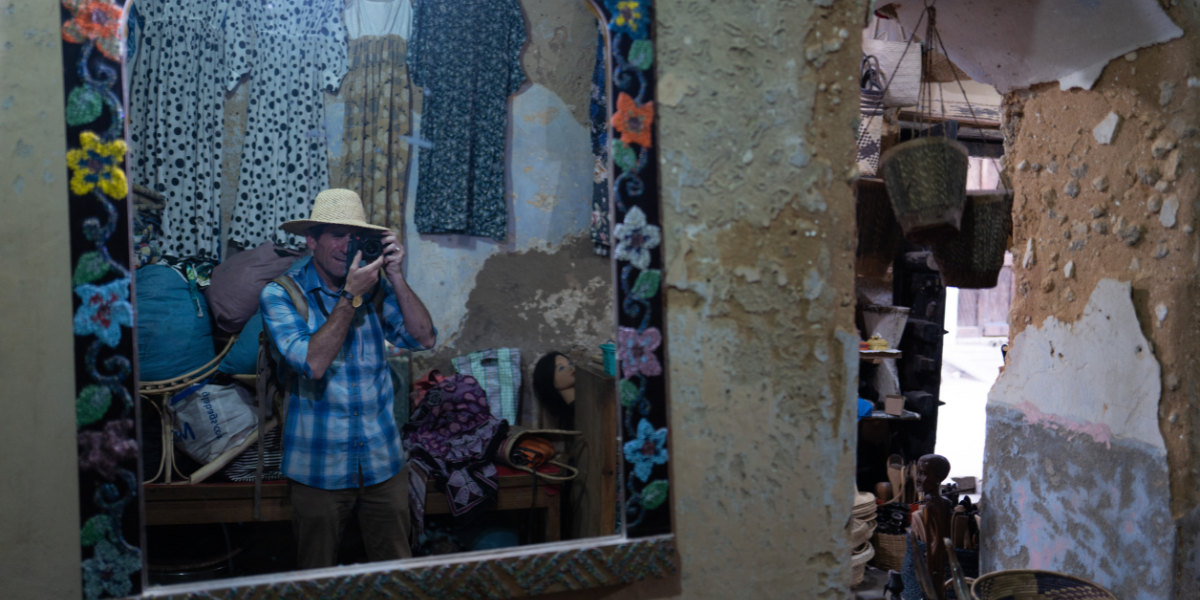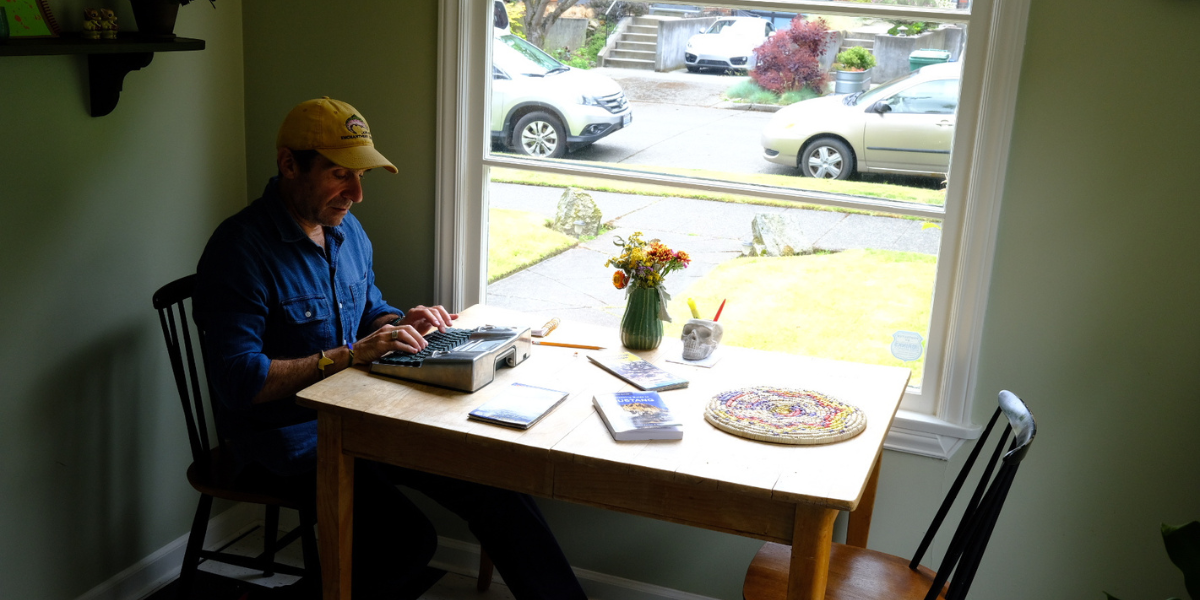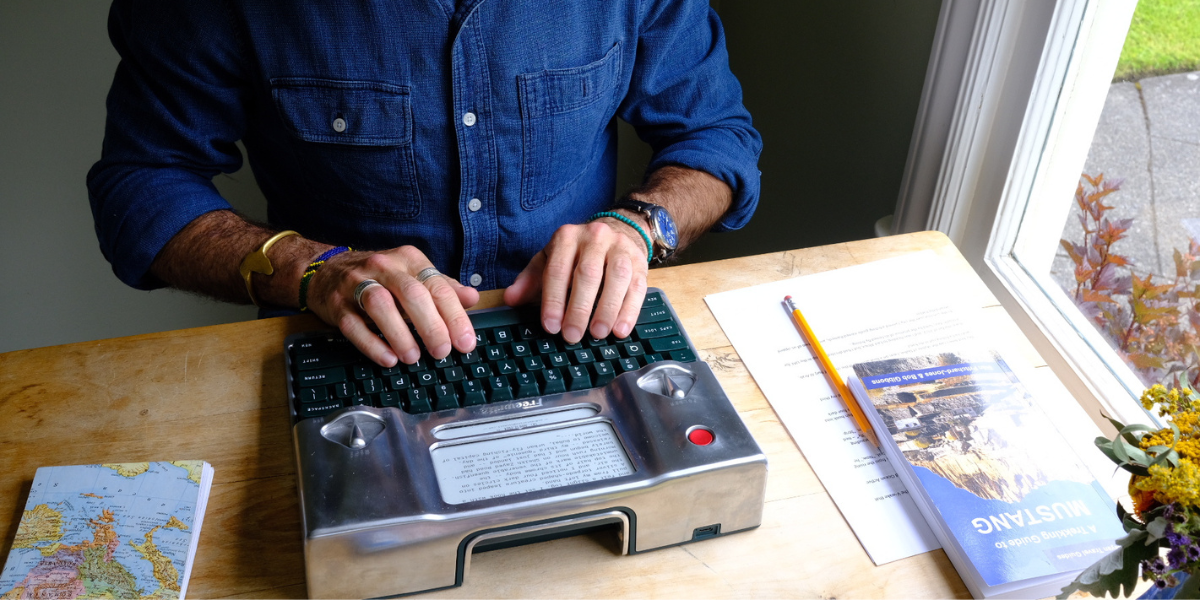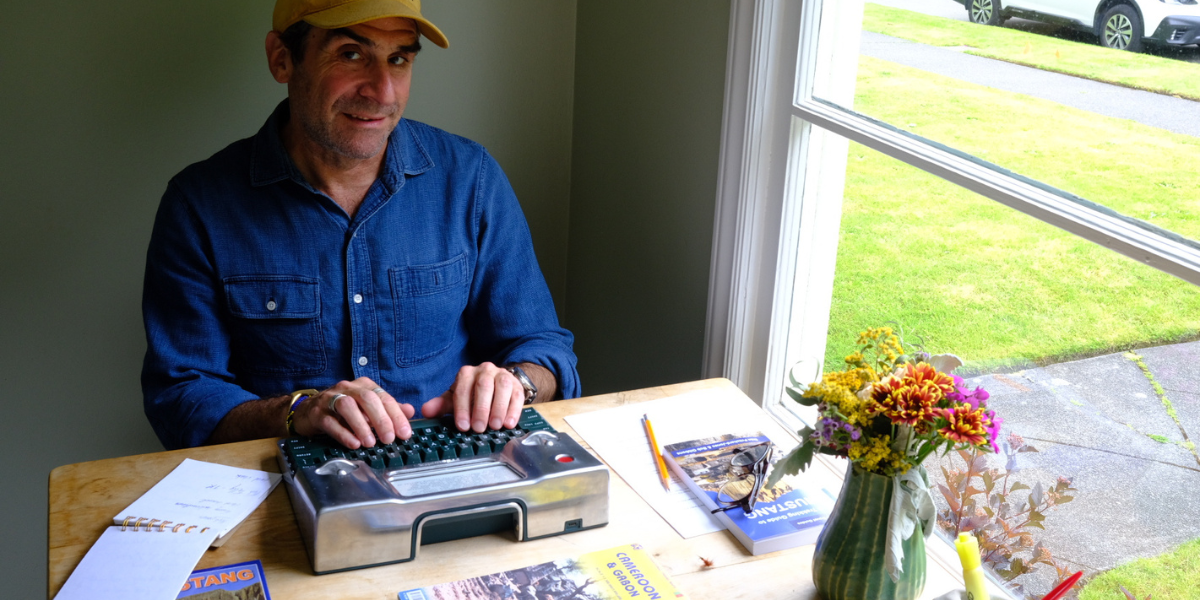He’s a certified volcano naturalist. He’s been a newspaper reporter and a photojournalist and has to use waterproof notebooks to journal on extreme trips.
He's fled angry hippos and hiked and skied on volcanoes around the world, from Mount Saint Helens to Iceland’s Fagradalsfjall, to Nevados de Chillan in Chile. Gabon. Oman. Nepal. His passport is full.
And he writes about it all on a Freewrite.

Andrew Tarica started out as a reporter at a small-town newspaper called the Kirkland Courier in 1991. But his career and travels would soon take him all over the world.
He spent most of 1995 backpacking and fishing around Australia and Asia, while writing and filing articles for the fledgling Pacific Rim News Service. After that, he worked for several prominent magazines and websites across the U.S. Now based in Seattle, Andrew is a freelance writer and photographer focused on travel and fishing, and writes on his “Hemingwrite," channeling the travel-writing chops of Papa Hemingway himself.
Read on to meet Andrew Tarica and discover life as a travel writer.

ANNIE COSBY: First things first — how has the world of journalism changed from your first job in 1991?
ANDREW TARICA: It’s been a massive change over the last 30 years. The biggest impact from my perspective is the downfall of the newspaper and other print publications as the internet has become a central part of our lives.
When I first started writing travel articles, just about every city in the U.S. had a newspaper with a dedicated travel section. Those are hard to find now.
Of course, the rise of the ’net has also presented writers with tons of new opportunities — for example, the ability to publish your own blog or website, which is neat.
But the question was about journalism, and I think, sadly, it’s becoming harder and harder to find good quality journalism out there.
"I think, sadly, it’s becoming harder and harder to find good quality journalism out there."
I feel fortunate to regularly work with a first-class magazine, called Virtuoso, which provides savvy travelers with inspiration on where to go next and luxe escapes around the world.
The editors at Virtuoso are tough but always fair, and they diligently fact-check every piece of my articles, which I think is really cool. It’s old-school journalism, and I love that.
AC: How did you first become interested in travel writing?
AT: I was studying journalism at the University of Colorado in Boulder in the late 80s when I first read Jaguars Ripped My Flesh by Tim Cahill, which was required reading for a geography class.
It’s a collection of adventure travel stories written by the founding editor of Outside magazine. I was captivated by this classic book and decided that was the kind of writing I wanted to pursue.
I was lucky enough to later meet Cahill at a writer’s conference in his hometown of Livingston, Montana. He’s not only a great writer — one of the best, in my opinion — but also a thoughtful editor. I consider him to be one of my mentors.
AC: Travel writing as a concept is a bit of a romantic ideal, isn't it? How does the actual experience line up with or diverge from the dream?
AT: That’s probably accurate. There’s a lot of work that goes into the publication of a travel story. It can take years for a story to see the light of day, and that can be frustrating.
Also, the life of a travel writer is unpredictable. For example, in February I spent a week in Nepal, exploring Kathmandu and the surrounding villages in the valley. However, the day before arriving, I heard from an editor back in the States, who needed a full rewrite on a feature I wrote about Oman.
Needless to say, I spent every night in Nepal focused on Oman, which wasn’t ideal. But in a way it was still romantic, as I spent a night holed up in the Sanjay Upadhya suite at the Kathmandu Guest House, a room dedicated to the famous Nepali author. I channeled his creative energy into my Omani rewrite.

AC: How do you make sure you're recording the important parts of what you're experiencing as you travel? It seems hectic.
AT: It can be hectic! For me, I take copious notes as I go along, using a reporter’s notepad. (For fishing trips, I use waterproof notebooks.)
Also, my goal while traveling is to record a journal entry every night. Sometimes these entries become parts of travel articles.
Typically, I don’t officially start writing the actual article until I get home from the trip.
"My goal while traveling is to record a journal entry every night... I don’t officially start writing the actual article until I get home from the trip."
AC: How does writing at home differ from writing on the road?
AT: For me, writing at home is much harder, but this is where the magic happens. It’s like re-living the trip and experiencing it a second time.
But it’s a challenge to write a story about your travels that appeals to someone other than you. An actual audience. The degree of difficulty, I think, is part of the reward.
But if you have good notes, as Cahill once told me, you should be able to write about anything, anytime.
AC: You're a photojournalist, as well. How do you decide when to use writing or when to use photojournalism to tell the stories you want to tell?
AT: The writing comes first for me, but I love taking photos, and I’ll always try and incorporate images into my final piece.
It’s up to the editor if they want to use them or not. Some editors like to use their own photographers and that’s OK, too.
AC: We read that your story on the opening of the new American Embassy in Vietnam, the first day of business since the fall of Saigon 21 years earlier, was filed from Hanoi. This got us wondering: What is the coolest or wildest thing that you've experienced or written about?
AT: I recently wrote a story about the passion and peril of fly-fishing guides in the East African nation of Tanzania. I really like this story because it focuses on the brotherhood that’s formed among these guides, who spend an intense season working themselves to the bone and guiding adventurous anglers around one of the wildest parts of Africa.
The guides know a lot about fish, and they also work in an environment where they are not at the top of the food chain. This story left me with an unforgettable impression of nature, taking things to the extreme, and pioneering new paths in fishing.

AC: Have you ever found yourself in a dangerous situation abroad?
AT: The most dangerous situation was probably getting chased by an angry male hippo in Tanzania. We were fishing on the Mynera River one morning when we startled the four-ton beast from its afternoon nap.
Luckily, we were in a boat and quickly retreated, as the hippo followed us for a few hundred yards, torpedoing toward us like an Olympic gold medalist.
Hippos may look goofy, but they are aggressive, territorial, and extremely dangerous creatures.
When even the guide is shaking, it’s safe to say that you dodged a bullet.
"The hippo followed us for a few hundred yards, torpedoing toward us like an Olympic gold medalist... When even the guide is shaking, it’s safe to say that you dodged a bullet."
AC: Let's talk finances, which is always interesting — and sometimes hard to figure out — for fellow writers.
AT: For most writers, travel writing is a pay-by-piece gig. And it is difficult to make a living doing this. A lot of writers will supplement their income with second jobs.
In my case, I’ve been renting out a place on the East Coast of the U.S. to make a few extra bucks.
I also taught a workshop this year on travel photography at an art festival in the United Arab Emirates called Ras Al Khaimah Fine Art Festival.
AC: Well that sounds fantastic in itself. Let's switch gears to your writing process. What does that look like?
AT: When not on deadline, I tend to write in spurts and enjoy writing while seated at my kitchen table with the big window nearby. When I’m working on a story, I will write every day.
I’ve been using my Freewrite to complete my rough drafts. Completing the first draft has always been a real challenge for me. I love the feel of the keys and how Freewrite forces me to keep moving forward, and to write with abandon.

"I love the feel of the keys and how the Freewrite forces me to keep moving forward, and to write with abandon."
AC: What's your #1 piece of advice for people who dream of travel writing?
AT: Read the work of the travel-writing masters, such as:
- Tim Cahill (Founding Editor of Outside magazine)
- Bruce Chatwin
- Dervla Murphy
- Tony Wheeler (Co-Founder of Lonely Planet)
- Bill Bryson
- Jan Morris
- Pico Iyer
Also, study the work of today’s top travel journalists, writers like:
- Stephanie Rosenbloom (New York Times)
- Christopher Reynolds (LA Times)
- Amelia Duggan (National Geographic Traveller UK)
AC: Last but not least, what are you working on right now?
AT: I’m working on a story about fly-fishing and gorilla trekking in Gabon, a small country that straddles the equator in Central Africa.
I am also working on a travel book about my experience backpacking across Asia with my fly rod. This is a passion project that I’ve been working on for many years. My plan is to self-publish at some point soon.
--
We can't wait to read about Andrew's adventures. In the meantime, find some of his favorite Virtuoso stories below:
- To the Edge of the World: A Journey to Haida Gwaii
- Tacos Forever: Our Favorite San Antonio Taquerias
- Once Upon Oman: 12 days in the Sultanate
Find more on Andrew’s website at andrew-tarica.squarespace.com or follow him on Instagram @andfromnyc.





















